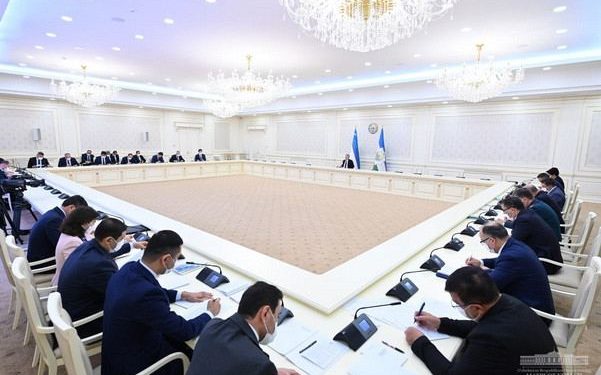On July 18, President of Uzbekistan Shavkat Mirziyoyev chaired a videoconference on increasing food production and increasing the income of the population, Trend reports with reference to the press service of the head of state.
The risks of food security are increasing in the world. Export restrictions and disruption of transport and logistics chains exacerbate the problem. According to the analysis, global food prices are expected to rise by at least 20 percent this year.
In Uzbekistan, 40-50 percent of household spending is on food. Therefore, measures are being taken to mitigate the impact of rising prices on the life of the population by increasing production.
In particular, since the beginning of the year, 80,000 hectares of sown land have been allocated to the population, released after the reduction of cotton and grain areas. The infrastructure of “Tomorka Khizmati” has been established to provide the population with seeds, seedlings and fertilizers. This year alone, 400 billion soums of concessional loans were provided for growing crops on household plots.
As a result of these opportunities, production increases and prices normalize. Over the past month, the cost of tomatoes in the domestic market has decreased by 3 times, cucumbers – by 10 percent, potatoes – by 30 percent, carrots – by 15 percent. In addition, 821,000 tons of fruits and vegetables were exported over 6 months, which is 102,000 tons more than last year.
It is also important that 785 thousand people were employed on the allocated lands.
The head of state identified new opportunities based on the proposals of the population. It was noted that another 20,000 hectares would be allocated to the population by the end of the year, and 100,000 hectares of sown land next year. The total area of allotments will reach 200 thousand hectares.
In order to help the population in the production and sale of products, instructions were given to deliver high-yielding seeds and seedlings to the regions, install small freezers, and increase the number of greenhouses.
Today, residents of 64 districts grow 3 crops a year on their household lands. With a good harvest, one family can earn up to 60-100 million soums.
The head of state stressed that such work should be stimulated in other regions as well.
In particular, it was decided to increase the size of the subsidy for the construction of large wells in areas with difficult water supply to 150 million soums. For small wells, a subsidy of 100,000 soums will be provided for each meter of well depth after 5 meters in Karakalpakstan, and more than 10 meters in other regions.
Hydrogeological reports on drilling wells will be provided free of charge until 2025. It was decided to extend subsidies for the introduction of water-saving technologies to farms.







